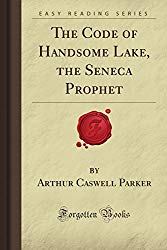The Great Message: Difference between revisions
An Avatar.Global Resource
mNo edit summary |
No edit summary |
||
| (3 intermediate revisions by 3 users not shown) | |||
| Line 1: | Line 1: | ||
{{navmenu}} | {{navmenu}} | ||
<h1 class="customtitle">{{FULLPAGENAME}}</h1> | <h1 class="customtitle">{{FULLPAGENAME}}</h1> | ||
<blockquote class="definition">'''[https://amzn.to/2H4fr8a The Great Message]''' is a prophetic vision, set in 130 sections, of Seneca prophet [[Handsome Lake]].<ref>Parker, Arthur C. [https://amzn.to/2H4fr8a The Code of Handsome Lake The Seneca Prophet.] New York: The University of the State of New York, 1913.</ref> It is a collection of spiritual, psychological, emotional, and sociological teachings, part of the Code of Handsome Lake. It is, in [[LP]] terms, a [[Healing Manual|healing]] and [[Connection Manual|connection manual]] provided, presumably, to help a devastated and colonized people heal, atone, align, and reconnect. | <blockquote class="definition">'''[https://amzn.to/2H4fr8a The Great Message]''' is a prophetic vision, set in 130 sections, of Seneca prophet [[Handsome Lake]].<ref>Parker, Arthur C. [https://amzn.to/2H4fr8a The Code of Handsome Lake The Seneca Prophet.] New York: The University of the State of New York, 1913.</ref> It is a collection of spiritual, psychological, emotional, and sociological teachings, part of the Code of Handsome Lake. It is, in [[LP]] terms, a [[Healing Manual|healing]] and [[Connection Manual|connection manual]] provided, presumably, to help a devastated and colonized people heal, atone, align, and reconnect. | ||
</blockquote> | </blockquote> | ||
==Haudenosaunee Terms== | |||
[[Haudenosaunee]] > {{#ask:[[Is a term::Haudenosaunee]]}} | |||
==Notes== | ==Notes== | ||
A fascinating spiritual book full of ageless and contextual wisdom. It should be read with an awareness of the psychologically, emotionally, and destructive impact of European colonization, as a spiritual and cultural attempt to overcome the profound devastation. | A fascinating spiritual book full of ageless and contextual wisdom. It should be read with an awareness of the psychologically, emotionally, and destructive impact of European colonization, as a spiritual and cultural attempt to overcome the profound devastation. Also contains some interesting prophecies, and may provide evidence that Seneca beliefs have been corrupted by [[Zoroastrian Archetypal Nodes]] | ||
Contains a wealth of aphorisms geared towards the established of aligned [[Right Thought]], [[Right Action]], and [[Right | Contains a wealth of aphorisms geared towards the established of aligned [[Right Thought]], [[Right Action]], and [[Right Environment]]. | ||
[[File:handsomelake.jpg|250px|center|link=https://amzn.to/2H4fr8a]] | [[File:handsomelake.jpg|250px|center|link=https://amzn.to/2H4fr8a]] | ||
| Line 16: | Line 18: | ||
{{template:endstuff}} | {{template:endstuff}} | ||
[[category:books]][[Is a::Healing Manual| ]][[Is a::Connection Manual| ]] | [[category:books]] | ||
[[Is a::Healing Manual| ]] | |||
[[Is a::Connection Manual| ]] | |||
[[Is a term::Haudenosaunee| ]] | |||
Latest revision as of 13:31, 6 July 2023
The Great Message
The Great Message is a prophetic vision, set in 130 sections, of Seneca prophet Handsome Lake.[1] It is a collection of spiritual, psychological, emotional, and sociological teachings, part of the Code of Handsome Lake. It is, in LP terms, a healing and connection manual provided, presumably, to help a devastated and colonized people heal, atone, align, and reconnect.
Haudenosaunee Terms
Haudenosaunee > Handsome Lake, Ka'nikonhrÌ:io, The Great Message
Notes
A fascinating spiritual book full of ageless and contextual wisdom. It should be read with an awareness of the psychologically, emotionally, and destructive impact of European colonization, as a spiritual and cultural attempt to overcome the profound devastation. Also contains some interesting prophecies, and may provide evidence that Seneca beliefs have been corrupted by Zoroastrian Archetypal Nodes
Contains a wealth of aphorisms geared towards the established of aligned Right Thought, Right Action, and Right Environment.

Citation and Legal
The SpiritWiki is a freely available, open-access Knowledge System devoted to health, healing, and reconnection. You may freely use information in the SpiritWiki; citation and attribution are welcomed, but not required. You can help this knowledge system grow by joining its Patreon.
The SpiritWiki is marked CC0 1.0 Universal and in the public domain, free for everyone on the planet to use. Please support its growth.
Footnotes
- ↑ Parker, Arthur C. The Code of Handsome Lake The Seneca Prophet. New York: The University of the State of New York, 1913.
